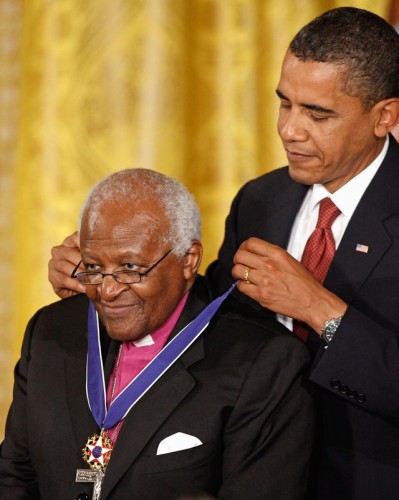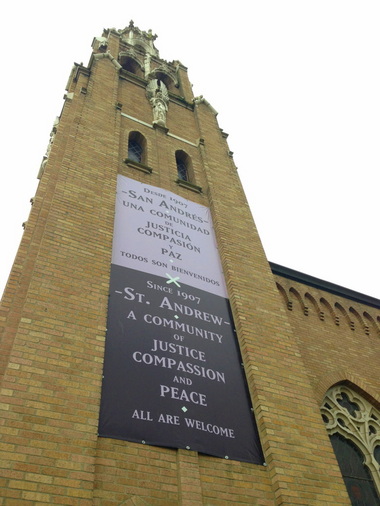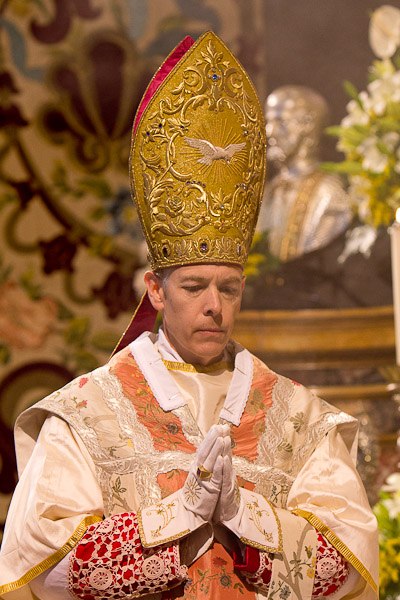By Jamie Manson
Much has been written about Austrian priest and reformer Helmut Schüller since he opened his 15-city U.S. tour, called “The Catholic Tipping Point,” in New York last week.
Schüller has been making news in the Roman Catholic church reform movement since 2006, when he and a group of fellow priests organized the Austrian Priests’ Initiative. In 2011, they made global headlines when they launched the “Call for Disobedience,” an appeal to the Vatican to address the shortage of priests and other predicaments facing the institutional church.
 The Austrian Priests’ Initiative is concerned that the dwindling number of clergy is impacting the quality of pastoral care offered to baptized Catholics. Their “Call for Disobedience” suggests reforms such as the ordination of women and married men to address this unfolding crisis.
The Austrian Priests’ Initiative is concerned that the dwindling number of clergy is impacting the quality of pastoral care offered to baptized Catholics. Their “Call for Disobedience” suggests reforms such as the ordination of women and married men to address this unfolding crisis.
What makes Schüller an intriguing figure among reformers is that he is not simply an upstart parish priest. He spent years as a hierarchical insider, filling the very public roles of president of Caritas Austria and vicar general under Austrian Cardinal Christoph Schönborn. He has the rare insight of one who has served both in the hierarchy and in the parish. Rarer still, he has risked his position and privilege to be in full, outspoken solidarity with lay Catholic reformers.
Hours before Schüller’s July 16 debut in New York City, he and I sat down for an interview. Since many of the goals and ideas we discussed — such as the plan for an international meeting of priests, the new evangelization, his thoughts about Cardinal Sean O’Malley’s barring him from speaking, and the institutional church’s treatment of same-sex couples — have not made it into most of the media coverage of his speaking engagements, I am offering the text of our conversation, which has been edited for length and clarity.
There’s more to NCR than what you read online. Preview our Spirituality special section from the July 19 edition.
You are using your summer break to embark on a 15-city U.S. tour. What are you hoping to accomplish?
This tour is a way for reform organizations and reform-minded priests to connect with one another. Our goal is to build up an international network of reform movements. We want to make public our sorrows, questions, issues and desire for our church and make it clear that reform-minded Catholics can be found throughout Europe and the United States.
In the United States, there aren’t many priests who openly belong to church reform groups. How will you reach out to them?
As I travel city to city, I’ll be meeting with priests informally in closed sessions. I’m encouraging priests in the U.S. to stay together with the lay movements. The priests here are cautious because there is a lot of pressure from the American bishops. We must be advocates for the people of God, especially when their initiatives are sidelined. I’m not completely familiar with the situation in the U.S. I’m hoping that the next few weeks will enrich my point of view of the struggles here.
Are reform movements in Austria similarly sidelined?
In Austria, we are in somewhat of a different situation. It is clear to our bishops that reformers have a very large majority behind them. We estimate that, in Austria, 80 percent of the Catholic faithful and two-thirds of the priests agree with our platform. If there is pressure from the bishops, the media helped to make it public. The bishops can’t sideline us easily because of public pressure.
Is there a plan to gather reform-minded priests together for a meeting?
The Austrian Priests’ Initiative, which I helped to found, is calling 2013 “a year of internationalization.” In October of this year, we are planning an international meeting of priests from Austria, Germany, France, Ireland, Great Britain, the U.S. and other countries to try to enlarge our network and further discuss the “Call to Disobedience.”
What motivates the “Call to Disobedience”and all of this organization by priests in Austria?
The priests in Austria have realized that after we retire, our communities will be merged. The priest shortage is an urgent, desperate situation. The lay members of our communities are the ones who are building up the church. The more parishes merge, the more that priests are losing the chance to walk with members of their communities through their daily lives. This is about more than compassion. It is about companionship and solidarity with laypeople. Life is not going to get any easier, and we want to offer people the service of the church.
Our second motivation comes from the questions that have arisen out of our pastoral care of our parish communities. The church’s doctrines on divorced and remarried Catholics and same-sex couples have created a lot of pastoral problems. We need a new teaching model on sexual relations. Our teaching should concentrate on the quality of relationships, not the form. Rather than condemning remarried Catholics or same-sex couples, we should be asking: How are they living in relationship? Are they respecting one another’s dignity? We have to respect that people want to live together, that they feel responsible for one another, and that they care for one another.
How did you become the public face of the Austrian Priests’ Initiative?
I was president of Caritas Austria and also served as vicar general for Cardinal Christoph Schönborn. I am better known in Austria because of these public roles, so I became the speaker of group. It helps with the media because they tend to only respect individual persons rather than whole movements. But the initiative is not my movement. A group of priests founded it, and we work as a community. We have a board that meets regularly to reflect on our work, discuss problems and give assistance to parish priests who are alone.
Some have claimed that the Roman Catholic church in Europe is either dying or being replaced by secularism. How do you respond to those claims?
Because of the history of reformation in Europe, the church has had to seriously engage with modern society. This doesn’t mean the church is dying. It is simply struggling with the questions of modernity. Yes, some faith communities are small, but they are very active.
We are confronting the questions, not giving in to secularism. Some want a “contrast church” that is contrary to society. But that’s not the idea of Jesus or the Gospels. The church should go into society and share the daily lives of the people.
Early in his pontificate, Pope Benedict XVI spoke of re-Christianizing Europe. Pope Francis appears passionate about the new evangelization. Do you think Europe needs to be evangelized?
If evangelization means that the Gospel has to be brought from “us” to “them” and that “they” have to accept that we [the hierarchy] have the wisdom, then I think there will not be success with the new evangelization. The first evangelization that is needed is the evangelization of the church.
Pope Francis seems to have started it now: to be simple, for the poor, to separate himself from wealth. Evangelization has to meet the people, to understand their questions, to understand changes in society, to respect that this modern society has realized a lot of originally Christian ideas, and to find again the origin of our Gospel.
If the new evangelization should become a monologue, there will be a problem. Yes, we have to preach the Gospel, but we must bring it in the language of our time. That’s not watering down the Gospel, but coming into dialogue with world about the Gospel.
What do you think of the claim that we are living in a “culture of death”?
The Second Vatican Council had an optimistic view of modern society. There was no talk of a culture of death. The bishops respected the successes of human society. Of course, Gaudium et Spes recognized that modern society has its darkness, chaos and conflict, but it also recognized that modern society developed the ideas about a fair and just society, about the equal participation of human beings, and the right to individual conscience. This really is the spirit of the [United Nations’] Declaration of Human Rights, and the council respected it.
Mater et Magistra made the point that the church’s position is not to look down on society and say it is dying, but rather to look at what is good in society and discuss what is problematic. The church should be a good companion to modern society. Of course, this is risky. It’s more comfortable to be in a fortress. But the way of Jesus is to go with the people wherever they are.
You were banned from speaking on Catholic grounds in Boston by Cardinal Sean O’Malley. Does it concern you that Cardinal O’Malley was one of eight cardinals Pope Francis chose for his “kitchen cabinet” of advisers?
Well, it’s not really a sign of hope, but let it be. These are the old-fashioned reflexes of an old-fashioned system of thinking. Rather than forbidding these discussions, the hierarchy could instead ask to be represented in these conversations. To forbid someone to speak is a sad thing, but the real sadness is forbidding people to listen.
For me, being banned from speaking is not dramatic — I’ll just go to another church. But for a bishop to say, “You must not listen”? That’s just not possible in our time. We live in an open society. People can get information wherever they want. But this vision of a church where the baptized are “protected” against getting information that the bishop doesn’t want them to have? It is a ridiculous point of view, I think. Maybe what we are seeing are the last reflexes of a dying system. I feel that these ways are fading out. Let’s forget it and be hopeful.
What about the hierarchy’s claim that you are creating disunity in the church?
In these conversations, we are gathering people here who are engaged in this church. They have discussions with me and one another, and then they return to their communities and continue their work for the church. We are not driving them out of the church; we are inspiring them to continue to ask for reform. It is their church. If the bishop could see who the people are who are gathering here, they would not be afraid that we are dividing the church. I think the contrary is happening. I have had people say to me: “I would have left, but after hearing you, I feel there is some hope in fighting for the church and its reform, so I will stay.”
What are the first steps you would like to see the pope and the bishops take in bringing about reform?
One of the important steps would be to encourage the bishops to be with the people, not to be against them in the name of the Vatican. A key move will be to decentralize papal authority and to call the bishops to collegiality and shared responsibilities. The bishops’ synod must function like a real synod. It’s the only way to give the bishops the possibility of filling the space with new ideas. Also, laypeople must be brought into the church’s decision-making. We must put pressure on church leaders to open dialogue and to use the gifts and charisms of the faithful.
What do you say to those who argue that your issues with the institutional church are unique to Europe and the U.S. and that the majority of the Roman Catholics who live in the global South and Asia do not share these concerns?
These societies will be confronted with same questions. Our Latin American and South American colleagues are already saying to us, “Don’t think we don’t have the same problems.” Globally, societies are changing very quickly. In 10 or 20 years, the global South will face the same questions we [face]. In mega-cities, they already are. Church leaders must not hope they can get around these questions. They will arise. Maybe the church in Europe and the U.S. should be thought of not as a dying church, but as a laboratory for the future, where the church engages with the modern society. We should not overestimate the numbers of people going to church, and we should not underestimate the problems the church is facing.
Complete Article HERE!
 Kueng, now 85 and suffering from Parkinson’s disease, writes in final volume of his memoirs that people have a right to “surrender” their lives to God voluntarily if illness, pain or dementia make further living unbearable.
Kueng, now 85 and suffering from Parkinson’s disease, writes in final volume of his memoirs that people have a right to “surrender” their lives to God voluntarily if illness, pain or dementia make further living unbearable.




